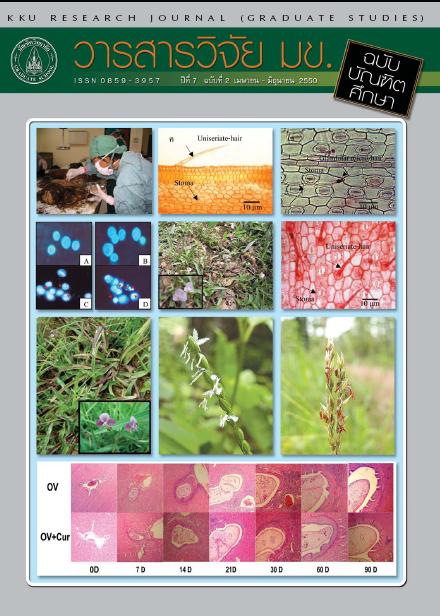The Relationships among Emotional Intelligence, Leadership and Followership of Professional Nurses in General Hospitals, Northeast Region 11, under The Ministry of Public Health
Keywords:
Emotional Intelligence( E.I)(สติปัญญาทางอารมณ์), Leadership(ภาวะผู้นำ), Followership(ภาวะผู้ตาม)Abstract
การวิจัยครั้งนี้มีวัตถุประสงค์เพื่อศึกษาความสัมพันธ์ระหว่างสติปัญญาทางอารมณ์กับภาวะผู้นำและภาวะผู้ตามของพยาบาลวิชาชีพ กลุ่มตัวอย่างเป็นพยาบาลวิชาชีพระดับปฏิบัติการในโรงพยาบาลทั่วไป 4 แห่ง ของเขต 11 ภาคตะวันออกเฉียงเหนือ กระทรวงสาธารณสุข จำนวน 130 คน ซึ่งได้จากการสุ่มตัวอย่างแบบง่าย เครื่องมือที่ใช้ในการวิจัย ประกอบด้วย แบบวัดสติปัญญาทางอารมณ์ของกรมสุขภาพจิต (2543) ค่าความเที่ยงเท่ากับ 0.85 แบบสอบถามคุณลักษณะภาวะผู้นำและแบบสอบถามคุณลักษณะภาวะผู้ตาม ที่ผู้วิจัยสร้างขึ้น ผ่านการตรวจสอบความตรงตามเนื้อหาและหาค่าความเที่ยงโดยใช้สัมประสิทธิ์อัลฟาของครอนบาค ได้เท่ากับ 0.95 ทั้งสองส่วน เก็บรวบรวมข้อมูลระหว่าง 1 สิงหาคม- 20 กันยายน 2549 โดยการส่งแบบสอบถามทางไปรษณีย์ วิเคราะห์ข้อมูลด้วยสถิติร้อยละ ค่าเฉลี่ย ส่วนเบี่ยงเบนมาตรฐาน และการวิเคราะห์สหสัมพันธ์คาโนนิคอล ผลการวิจัย พบว่า ค่าเฉลี่ยสติปัญญาทางอารมณ์ภาพรวมของพยาบาลวิชาชีพส่วนใหญ่อยู่ในระดับปกติ (ค่าเฉลี่ย 171.37 ส่วนเบี่ยงเบนมาตรฐานเท่ากับ 13.92) ภาวะผู้นำ ภาวะผู้ตามของพยาบาลวิชาชีพ ส่วนใหญ่อยู่ในระดับปานกลาง(ค่าเฉลี่ย 3.88, 3.86 ส่วนเบี่ยงเบนมาตรฐานเท่ากับ 0.43, 0.40 ตามลำดับ) วิเคราะห์ได้ค่าสหสัมพันธ์คาโนนิคอลระหว่างชุดตัวแปรอิสระของสติปัญญาทางอารมณ์สามองค์ประกอบ ด้านดี ด้านเก่งและด้านสุข กับชุดตัวแปรตามภาวะผู้นำ และภาวะผู้ตามของพยาบาลวิชาชีพ เป็น 2 ชุด ชุดที่ 1 มีความสัมพันธ์กันสูงอย่างมีนัยสำคัญทางสถิติที่ระดับ .001 มีค่าเท่ากับ .728 และสามารถอธิบายความผันแปรร่วมได้ร้อยละ 52.99 เกิดจากความสัมพันธ์ระหว่างตัวแปรสติปัญญาทางอารมณ์ด้านเก่ง ด้านดี และด้านสุข กับตัวแปรตาม ภาวะผู้นำ และภาวะผู้ตาม ส่วนชุดที่ 2 เท่ากับ .200 สามารถอธิบายความผันแปรร่วมได้ร้อยละ 4.00 เป็นความสัมพันธ์กันระดับต่ำอย่างไม่มีนัยสำคัญทางสถิติ สรุปว่า สติปัญญาทางอารมณ์ด้านดี ด้านเก่ง และด้านสุข มีความสัมพันธ์กับภาวะผู้นำ และภาวะผู้ตามThe purposes of this research were to study the relationships among emotional intelligence (E.I), leadership and followership of professional nurses. Samples were 130 staff nurses in 4 general hospitals, Northeast region 11, The Ministry of Public Health, selected by simple random sampling. Research instruments included E.I. DMH (2543) measurement reliability 0.85, the leadership and followership questionaires were developed by researcher, content validated by 5 experts and reliability tested by Cronbachûs alfa coefficiency all of them were 0.95. Data were collected during 1 August - 20 September 2006, via sending mail. Analising data were used mean, standard deviation and canonical correlation statistics. The result showned that all of E.I. was at normal level (mean 171.37) , leadership and followership of professional nurses were at a moderated level (mean 3.88, 3.86 S.D. 0.43, 0.40 respectively). Two sets of canonical correlation were found. Set 1 was significant positive canonical correlation . (p<0.001, Rc = 0.728) The resulting from relationships between the variables of E.I. in the competence structure, virtue structure, happiness structure and the variables of leadership and followership. The predicting power were at 52.29%. Set 2 was not significant canonical correlation was in low level (Rc = 0.200), the predicting power were at 4.00%. Inconclusion, the three structure of E.I. had relationships with leadership and followership



